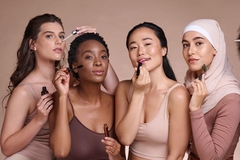LaFlore releases microbiome testing kit for personalized skin care

LaFlore Live Probiotic Skin Care has launched a skin health testing kit that evaluates the skin microbiome for personalized skin care recommendations. LaFlore’s innovation taps into growing consumer demand for tailored beauty solutions.
The kit uses a test strip system to evaluate the microbiome’s overall health and bacterial balance. It creates a 20-page report with findings, a skin care routine, and product recommendations for the customer.
LaFlore partnered with Sequential Bio for the kit and uses the company’s real-time quantitative polymerase chain reaction (qPCR) technology to analyze bacterial diversity, skin health markers, and biological skin age on the test strip.

Dr. Oliver Worsley, CEO at Sequential, highlights the significance of microbiome testing, stating: “To truly understand the health of your skin, you need to understand the ‘invisible players’ within the skin microbiome. The LaFlore Skin Health Testing Kit is powered by over 25,000 microbiome samples and delivers personalized skin care recommendations to achieve lasting skin health.”
According to the US Census and Simmons National Consumer Survey, the average American spends approximately US$15,000 on skin care in their lifetime, demonstrating consumers’ commitment to investing in their routines.
LaFlore aims to eliminate guesswork and enhance skin care effectiveness by providing consumers with microbiome insights and tailored product recommendations. The kit’s release aligns with the broader industry trends of microbiome care and customizable solutions.
Understanding the skin microbiome
LaFlore’s Skin Health Testing Kit uses qPCR, a scientific method for measuring small amounts of DNA in a sample. The method works by making copies of specific genetic material and tracking them in real-time. This is evaluated to see what kinds of bacteria are present and in what amounts.
In skin care, qPCR reveals which bacteria may affect skin health, premature aging, or conditions like acne and rosacea.
This approach helps users understand their skin’s microbiome balance and take proactive steps to improve it.
 The kit uses a test strip system to evaluate the microbiome’s overall health and bacterial balance.The kit also determines the user’s biological skin age, aiming to deliver insights into the skin’s vitality beyond its chronological age. This analysis is designed to provide users with information about their specific aging concerns and optimize product selection and methods of application.
The kit uses a test strip system to evaluate the microbiome’s overall health and bacterial balance.The kit also determines the user’s biological skin age, aiming to deliver insights into the skin’s vitality beyond its chronological age. This analysis is designed to provide users with information about their specific aging concerns and optimize product selection and methods of application.
Based on the evaluation, the report offers recommendations such as skin care ingredients, products, optimized daily routines, and monthly facial suggestions to balance the microbiome.
Microbiome innovation
Scientific research increasingly supports the idea that a balanced microbiome is essential for healthy skin. Recent advancements in microbiome science have linked bacterial diversity to inflammation control, collagen production, and overall skin resilience.
As consumer awareness of skin microbiome health expands, brands investing in microbiome-friendly formulations and testing methods are gaining competitive advantages.
L’Oréal Groupe recently partnered with Korean start-up NanoEnTek and unveiled a device that provides personalized skin analysis in five minutes to show how mechanisms in the human body can affect skin appearance. The device uses advanced proteomics, which studies how protein composition in the human body affects skin aging.
Japanese scientists also previously created a commercial bacteria culture that can support multiple skin bacteria simultaneously, opening the door for improved laboratory testing of personal care products on the skin microbiome.













